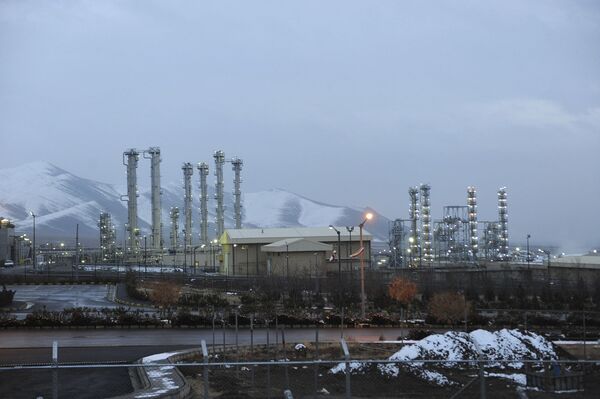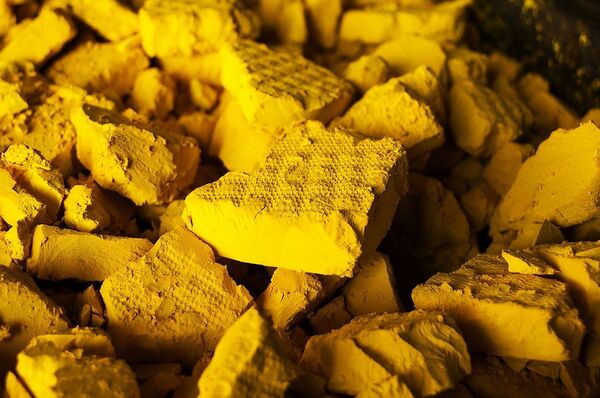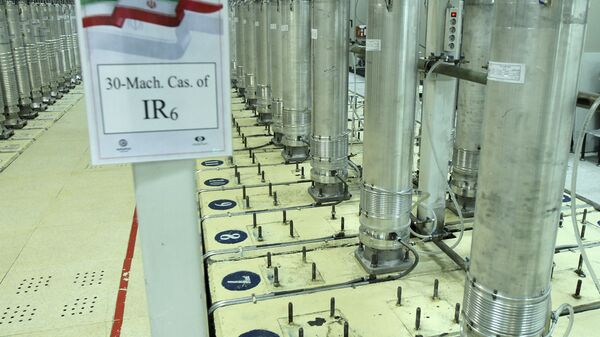On Tuesday, Ali Akbar Salehi, the head of the Atomic Energy Organization of Iran (AEOI), announced the country would increase its production of 20% enriched uranium to eight times its present amount.
"This year, the production of yellowcake will be between 35 and 40 tons, which means that we have 8-folded the production of yellowcake," Salehi said, according to Fars News Agency. He added the country can produce between 17 and 20 grams of uranium with 20% purity per hour.
"Until three or four years ago, we used to produce an average of 4 to 5 tons of yellowcake, but for the past two years, we have increased the production of yellowcake to 30 tons,” he added.
When mined, uranium contains several isotopes, but only U-235 can be used for nuclear fission reactions like those that power nuclear power plants and nuclear weapons. By removing the other uranium isotopes, the enriched uranium becomes more reactive and takes the form of a powdery substance called yellowcake. However, the enrichment process requires fast-spinning centrifuges - Iran’s access to which is greatly limited by the terms of the 2015 Joint Comprehensive Plan of Action (JCPOA).
To that end, Salehi said the country was “currently installing one thousand IR-2m centrifuges” that would speed up Iran’s enrichment rate from 8 or 9 kilograms per month to 120 kilograms, in line with the Iranian Parliament’s “Strategic Action to Lift Sanctions” passed last month.
However, Iranian Deputy Foreign Minister Abbas Araqchi said on Monday that resumption of 20% uranium enrichment remains in compliance with the Non-Proliferation Treaty and the JCPOA, citing Article 36 of the 2015 document, which outlines the resolution of disputes with other agreement signatories.
“The IAEA [International Atomic Energy Agency] had been fully informed about the decision and all the required legal steps had been taken in presence of IAEA inspectors,” he added, according to Fars.

However, Russia, another JCPOA signatory, has criticized the move as a step away from the deal.
Iran Won't Crawl Back to Nuclear Deal
The 2015 nuclear deal saw international economic sanctions lowered against Iran in exchange for its agreement not to develop nuclear weapons and to accept strict limits on its production of refined uranium. The country operates just a handful of nuclear facilities, including refineries in Fordow and Natanz and power plants in Arak and Bushehr that can be powered by the low-grade refined uranium.
In 2018, the US unilaterally withdrew from the JCPOA and reimposed economic sanctions on Iran. US President Donald Trump claimed Iran had been secretly violating the terms of the deal, but other partners to the deal disagreed and remained within its confines. The sanctions have severely damaged Iran’s economy and exacerbated the effects of the COVID-19 pandemic there.
US President-elect Joe Biden has indicated he is willing to return to the deal after being inaugurated on January 20. However, Araqchi noted that Tehran wouldn’t be rushing to meet Washington in the middle.
“Westerners are suffering from a delusion and think that due to pressures imposed on the country by US sanction in the past years, the Islamic Republic is ready and will quickly embrace America’s return to the deal and so they can set conditions for the lifting of the sanctions. This is a completely wrong and delusional understanding,” the diplomat said.
“Steps in reducing JCPOA-related commitments come in response to other parties’ failure to fulfill their obligations under the deal after the unilateral withdrawal of the United States,” he added.
Iran Rejects Claims of Nuclear Bomb Program
Israeli Prime Minister Benjamin Netanyahu has claimed Iran’s decision to produce more uranium at higher purity is proof it is resuming nuclear weapons construction - something Araqchi dismissed on Tuesday.
“We adhere to our principle on nuclear weapons being religiously forbidden. Nukes have no place either in our religious principles or in our defensive and security calculations,” he said.

Uranium is not typically used to construct nuclear weapons, although very highly refined uranium it was used in some of the first nuclear bombs. Most modern nuclear bombs use plutonium-239, which is created by processing uranium-238.
According to the US’ Lawrence Livermore National Laboratory, which designed much of the United States’ nuclear arsenal, while it’s technically possible to build a nuclear bomb using 20% enriched uranium, you would need 10 times the amount of fuel as if you used 90% enriched uranium.
“The judgement of the weapons designers, who provided the technical input to the IAEA for formulation of the definition of non-weapons-usable 235U, was that weapons with such large minimum critical masses would not be practicable to design,” they wrote.




